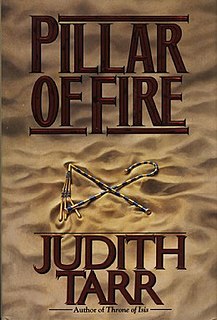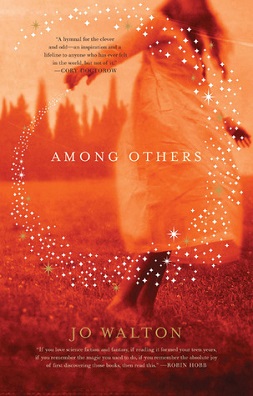
Proserpina or Proserpine is an ancient Roman goddess whose cult, myths and mysteries were combined from those of Libera, an early Roman goddess of wine, and the Greek Persephone and Demeter, goddesses of grain and agriculture. The originally Roman goddess Libera was daughter of the agricultural goddess Ceres and wife to Liber, god of wine and freedom. In 204 BC, a new "Greek-style" cult to Ceres and Proserpina as "Mother and Maiden" was imported from southern Italy, along with Greek priestesses to serve it, and was installed in Libera and Ceres' temple on Rome's Aventine Hill. The new cult and its priesthood were actively promoted by Rome's religious authorities as morally desirable for respectable Roman women, and may have partly subsumed the temple's older, native cult to Ceres, Liber and Libera; but the new rites seem to have functioned alongside the old, rather than replaced them.

Harry Norman Turtledove is an American novelist, best known for his work in the genres of alternate history, historical fiction, fantasy, and science fiction and mystery.

Dionysus or Dionysos is the god of the grape-harvest, winemaking and wine, of fertility, orchards and fruit, vegetation, insanity, ritual madness, religious ecstasy, festivity and theatre in ancient Greek religion and myth.

In ancient Roman religion and mythology, LiberLY-bər, Latin: [ˈliːbɛr]; "the free one"), also known as Liber Pater, was a god of viticulture and wine, fertility and freedom. He was a patron deity of Rome's plebeians and was part of their Aventine Triad. His festival of Liberalia became associated with free speech and the rights attached to coming of age. His cult and functions were increasingly associated with Romanised forms of the Greek Dionysus/Bacchus, whose mythology he came to share.

Ariadne was a Cretan princess in Greek mythology. She was mostly associated with mazes and labyrinths because of her involvement in the myths of the Minotaur and Theseus. The ancient Roman author Hyginus identified Ariadne as the Roman Libera/Proserpina at approximately the same time as Libera was officially identified with Proserpina in 205 BC, these two names becoming synonymous for the same goddess. Hyginus equated Libera/Proserpina with Ariadne as bride to Liber whose Greek equivalent was Dionysus, the husband of Ariadne.

In ancient Roman religion and myth, Caca or Cacia is the giantess sister of Cacus, the son of Vulcan who stole cattle from Hercules during the course of his western labors. Caca betrays her brother by revealing the location of the cattle to Hercules, who had in turn stolen the cattle from Geryon.

Jo Walton is a Welsh-Canadian fantasy and science fiction writer and poet. She won the John W. Campbell Award for Best New Writer in 2002 and the World Fantasy award for her novel Tooth and Claw in 2004. Her novel Ha'penny was a co-winner of the 2008 Prometheus Award. Her novel Lifelode won the 2010 Mythopoeic Award. Her novel Among Others won the 2011 Nebula Award for Best Novel and the 2012 Hugo Award for Best Novel; Among Others is one of only seven novels to have been nominated for the Hugo Award, Nebula Award, and World Fantasy Award.

In Ancient Egyptian religion, Taweret is the protective ancient Egyptian goddess of childbirth and fertility. The name "Taweret" (Tȝ-wrt) means "she who is great" or simply "great one", a common pacificatory address to dangerous deities. The deity is typically depicted as a bipedal female hippopotamus with feline attributes, pendulous female human breasts, the limbs and paws of a lion, and the back and tail of a Nile crocodile. She commonly bears the epithets "Lady of Heaven", "Mistress of the Horizon", "She Who Removes Water", "Mistress of Pure Water", and "Lady of the Birth House".

Lest Darkness Fall is an alternate history science fiction novel written in 1939 by American author L. Sprague de Camp. The book is often considered one of the best examples of the alternate history genre; it is certainly one of the earliest and most influential. Prominent alternate history author Harry Turtledove has said it sparked his interest in the genre as well as his desire to study Byzantine history.
Judith Tarr is an American fantasy and science fiction author. She received her B.A. in Latin and English from Mount Holyoke College in 1976, and has an M.A. in Classics from Cambridge University, and an M.A. and PhD in Medieval Studies from Yale University. She taught Latin at Wesleyan University from 1990 to 1993.
The Liberalia is the festival of Liber Pater and his consort Libera. The Romans celebrated Liberalia with sacrifices, processions, ribald and gauche songs, and masks which were hung on trees.
Susan Shwartz is an American author.

Pillar of Fire is a 1995 historical fantasy novel by Judith Tarr. It deals with the reigns of Egyptian pharaohs Akhenaten and Tutankhamun and the Exodus from the perspective of a Hittite slave girl of Ankhesenpaaten. It draws heavily on Ahmed Osman's theory that Moses and Akhenaten were the same person.

Nuit is a goddess in Thelema, the speaker in the first Chapter of The Book of the Law, the sacred text written or received in 1904 by Aleister Crowley.

Ha'penny is an alternative history novel written by Jo Walton and published by Tor Books. First published on October 2, 2007, it is the second novel of the Small Change series.

A Different Flesh is a collection of alternate history short stories by American writer Harry Turtledove set in a world in which Homo erectus and various megafauna survived in the Americas instead of Native Americans or any other human cultures.

Among Others is a 2011 fantasy novel written by Welsh-Canadian writer Jo Walton, published originally by Tor Books. It is published in the UK by Corsair. It won the 2012 Nebula Award for Best Novel, the Hugo Award for Best Novel and the British Fantasy Award, and was a nominee for the World Fantasy Award for Best Novel.












